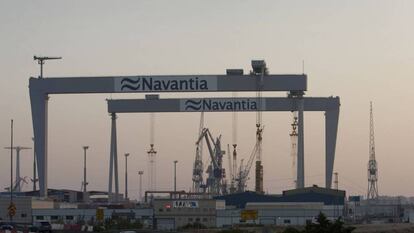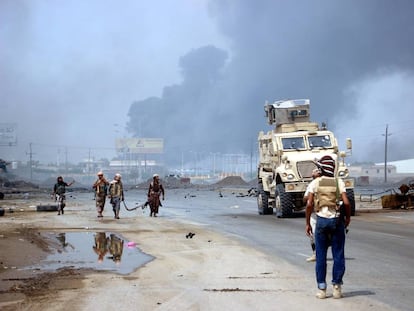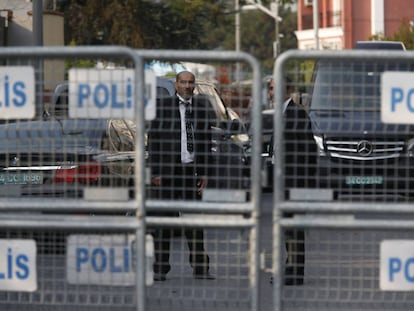Spain signed €48 million in irregular arms deals with Saudi Arabia
The state-owned company Defex is under investigation for paying illegal commissions to officials and execs in exchange for weapons contracts

An investigation by the Spanish High Court, Audiencia Nacional, into the sale of defense equipment to Saudi Arabia has confirmed the payment of bribes and illegal commissions by the public company Defex in 11 contracts signed between 2005 and 2013 worth a combined €48 million.
Execs are under scrutiny for keeping up ¡°a systematic criminal behavior pattern¡± for over two decades
Eight of those deals were for different types of ammunition, while the other three involved the delivery of replacement parts for the Saudi army¡¯s AMX-30 battle tanks. Five more suspect contracts signed between 1992 and 2004 have been left out of the investigation because they are past the statute of limitations.
Defex, which is 51% state-owned through the holding company SEPI (the other 49% is controlled by private arms companies), has been under scrutiny since 2014, when the Civil Guard uncovered a suspect sale of police equipment to Angola involving heavily padded invoices; the extra money was allegedly shared out among government workers in the African country, Spanish company execs and their intermediaries.
Ships for Saudi Arabia

Meanwhile, construction is due to begin in January on the first of five warships for Saudi Arabia by the Spanish shipyard Navantia. The ship will be ready for delivery by November 2021, according to estimates by the public holding company SEPI.
The contract came into question in June, shortly after a Socialist administration took over from the previous conservative government. The new defense minister, Margarita Robles, questioned a planned sale of 400 guided missiles by the Spanish army to Saudi Arabia, citing concerns that they might be used in the Yemen war, and Riyadh responded by threatening to cancel all other business deals with Spain.
The assassination last month of dissident Saudi journalist Jamal Khashoggi at the Istanbul consulate increased public pressure to halt Spanish arms sales to Saudi Arabia. But Prime Minister Pedro S¨¢nchez recently told Congress that the sales will proceed to defend "the interests of Spain."
The scandal brought down Defex, which is currently in liquidation. Its top officials ¨C the former president Jos¨¦ Ignacio Encinas and ex-chief of operations ?ngel Mar¨ªa Larumbe ¨C are under investigation for keeping up ¡°a systematic criminal behavior pattern¡± for over two decades, according to Judge Jos¨¦ de la Mata.
Digging deeper, investigators found irregularities in the sale of defense equipment to other countries, including Saudi Arabia. As a public company, Defex was able to secure the necessary permits to export arms and ammunition. Later, through the creation of a ¡°complex constellation¡± of companies ¨C as defined by Swiss authorities who were queried for information by the High Court ¨C Defex paid illegal commissions in exchange for no apparent commercial service to individuals with good connections to Saudi authorities, and also to Defex executives.
This web of companies was allegedly created in Luxembourg by Beatriz Garc¨ªa Paesa, niece of Francisco Paesa, a notorious former spy who did jail time in Switzerland for fraud in the late 1970s.
The Saudi Arabia probe began in 2015 and first targeted 16 operations made between 1992 and 2014, Spanish and Swiss legal documents show. The first five were ruled out because of the statute of limitations, and the Civil Guard focused on the remaining transactions (see box below).
Judge De la Mata has nearly concluded his inquiry, and is awaiting the last reports from the Civil Guard. The investigation has shed light, among other things, on a company based in the Cayman Islands and a payment of €7.6 million through Swiss accounts to a Saudi company for fake services. Swiss authorities have blocked at least four bank accounts in connection with these financial transactions.
Other individuals under investigation include former Defex executive ?lvaro Cervera and a businessman named Charles Ques.
The suspect contracts
2005. One contract to supply spare parts for AMX-30 battle tanks, worth €4,033,760.
2007. One contract to sell 25,000 rubber track pads for armored vehicles, worth €1,868,530.
2008. One contract to supply 11,292,000 9mm caliber cartridges worth €5,277,638. Another contract to deliver spare parts for AMX-30 battle tanks worth €1,320,165.
2011. Four ammunition contracts: one to supply 118,000 12.7mm Sniper cartridges (€484,331), 105mm projectiles (€2,609,402), 155mm ammunition (€8,337,840) and 3,000 105mm projectiles (€294,000).
2012. One contract to sell 3,450 106mm cartridges (€4,950,750). Another contract for two types of 155mm projectiles (€5,913,000).
2013. One contract to supply 7,500 150mm HEA-TT projectiles and 2,000 WP projectiles (€13,492,000).
English version by Susana Urra.
Tu suscripci¨®n se est¨¢ usando en otro dispositivo
?Quieres a?adir otro usuario a tu suscripci¨®n?
Si contin¨²as leyendo en este dispositivo, no se podr¨¢ leer en el otro.
FlechaTu suscripci¨®n se est¨¢ usando en otro dispositivo y solo puedes acceder a EL PA?S desde un dispositivo a la vez.
Si quieres compartir tu cuenta, cambia tu suscripci¨®n a la modalidad Premium, as¨ª podr¨¢s a?adir otro usuario. Cada uno acceder¨¢ con su propia cuenta de email, lo que os permitir¨¢ personalizar vuestra experiencia en EL PA?S.
En el caso de no saber qui¨¦n est¨¢ usando tu cuenta, te recomendamos cambiar tu contrase?a aqu¨ª.
Si decides continuar compartiendo tu cuenta, este mensaje se mostrar¨¢ en tu dispositivo y en el de la otra persona que est¨¢ usando tu cuenta de forma indefinida, afectando a tu experiencia de lectura. Puedes consultar aqu¨ª los t¨¦rminos y condiciones de la suscripci¨®n digital.










































